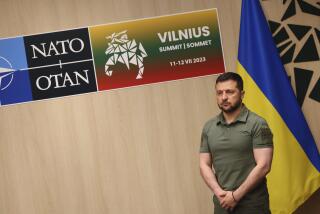How to Spell Relief: Disengagement : Monumental agreement in Vienna opens the way to lower defense expenditures
- Share via
Add Vienna to the scenes of dramatic changes in East-West relations that started in Poland just last year.
Seventeen years ago this month, delegates gathered in Vienna to talk about cutting the number of troops, tanks and artillery massed along the East-West border in Europe. For most of the time since then, the North Atlantic Treaty Organization and the Warsaw Pact could not even agree on how many troops each had, let alone how deeply the numbers could be cut.
Suddenly, with the world preoccupied with the Persian Gulf, the United States and the Soviet Union have discovered that they have nothing important left to negotiate and probably will sign a treaty late next month that will, in effect, dismantle the ground forces of the Cold War.
Agreement was, in fact, delayed by the collapse of Communism in Eastern Europe. So many Warsaw Pact forces collapsed with it that the Soviets insisted that both sides catch up with reality by negotiating a lower maximum number of troops.
Diplomatic rules required Secretary of State James A. Baker III and Soviet Foreign Minister Eduard A. Shevardnadze to make their agreement conditional on approval from their allies in Europe, but both have been pressing hard for accord.
The struggling new democracies of Eastern Europe have more important things to spend money on than troops--new factories and consumer goods among them. Western Europe is little more than a year away from implementing the European Communty, which will mean a major change in the way Europe does business. It wants to clear away as many obstacles to success as possible.
The Soviets need relief. Radical economic reforms are taking shape in the Russian Federation and other republics, and Soviet President Mikhail S. Gorbachev is trying to decide whether to follow suit. Cuts in defense spending are essential to Moscow if it is to have any hope of getting its economy back on track.
And with the U.S. economy scraping along in some parts of the country, Washington will welcome even the modest cuts in defense spending that disengagement in Europe will make possible. Eventually, American troop reductions in Europe could save some $12 billion a year.
Finally, save room for another scene of change: Moscow. Early next year, the superpowers hope to agree on how to start dismantling nearly half of the big nuclear missiles which cast such a menacing shadow during the Cold War that none dared use the troops massed along the East-West border.
More to Read
Sign up for Essential California
The most important California stories and recommendations in your inbox every morning.
You may occasionally receive promotional content from the Los Angeles Times.










